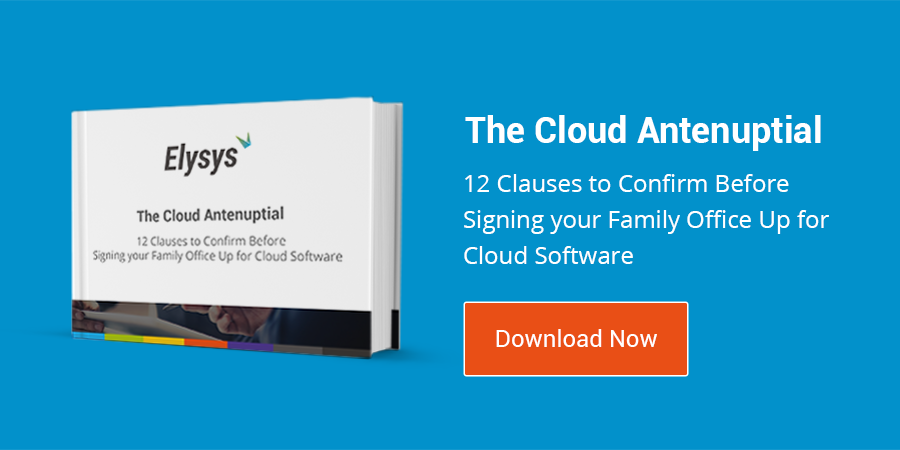Investment performance analysis for your family office software
The primary goal of the family office is to maintain the capital of the family and to provide revenue to beneficiaries. With prevailing global low interest rates, family offices are forced to rely heavily on investing to fulfil this mandate of generating return on family assets.
A diverse investment portfolio potentially holds stable income and growth of family assets. At the same time many family office investment managers are looking carefully at their fees, expecting to get more value for their money from internal teams for front office portfolio analysis, rather than using costly external asset managers and advisors. If this scenario sounds familiar to you, it’s time to re-evaluate the front office activities of your family office.
Understanding the Difference between Investing and Speculating
John Kay explains the difference between investors and traders in his book Other People’s Money as follows:
"A good investor understands the fundamental value of securities, whereas a trader is adept at predicting the changing moods and mindsets of other traders; individuals who are skilled at analysing the massive volumes of data generated by securities markets are classified as quants."
While quantitative and qualitative analysis tools, such as probability distributions, multiple regression, etc. improve visibility in forecasting by providing probabilistic rather than deterministic results, it is imperative that users are aware of their limitations, particularly in terms of tail-end risks.
Success stories in consistent maximisation of alpha are, statistically, few and far between. Daniel Kahneman, Nobel Prize winner in Economic Sciences, gives us the lay of investment-land in his book, Thinking Fast and Slow (emphases my own):
The reality of the stock market is that most fluctuations in price are caused by macro events; geopolitical uncertainty (Brexit, the terrorist attack on the Twin Towers in 2001) and natural disasters (the Fukushima disaster of 2011, and the deadly Japan earthquakes of April this year) that have been simply unforeseeable.
For this reason family office investors who desire to maximise profits from their portfolios and investments would be wiser to proceed with caution when making use of complex and opaque analysis tools, and instead rely more strongly on the fundamentals.
The Fundamentals of Investment
In contrast to more traditional wealth managers that aim to deliver a certain return above inflation over a rolling period (1 year, 2 years, 3 years), the family office’s investment perspective is long term (many generations long), reinforces Tara Loader-Wilkinson when writing on Family Fortunes for the Wall Street Journal. Basing your investment decisions on a methodology suited to generating returns over a shorter period in an FO environment is therefore not only a gamble, but inappropriate to the family’s investment term.
“Succesful Investing is beautifully boring,” writes Charl Fontini. "If investing is entertaining, if you’re having fun, you’re probably not making any money. Good investing is boring,” hedge fund guru, George Soros adds.
Investment in the family office software needs to start with the fundamentals of performance analysis, for example:
- Build models on the basis of long term strategy and te underlying investment fundamentals.
- Use their portfolio management software to track performance against strategy and family mandates and be ready to take corrective action based on timely alerts received from your system.
- Hedge exposures through swaps, derivatives and futures to adopt the desired level of conservatism.
- Use cash flow forecasting at the corporate and consolidated level to anticipate any shortfalls and to plan leveraging.
- Make sure that you have accurate and timely data at your fingertips, data such as average and time-weighted returns, IRR and DCF calculations.

There’s no reliable analysis and forecast without reliable underlying data
The financial industry can rightfully boast paternity of the field of predictive analytics, Big Data and even early AI adoption that is now making waves across the business world. Where Business Intelligence (BI) used to be the exclusive domain of chartists and financial analysts, Google and AI have brought the concept of predictive analytics to the globe’s attention in just about every area of daily life.
![]() Portfolio and investment analysis will always be an important aspect of front office operations in family offices. Portfolio managers and investment teams who are heading into the terrain of BI must take car to always bear in mind that:
Portfolio and investment analysis will always be an important aspect of front office operations in family offices. Portfolio managers and investment teams who are heading into the terrain of BI must take car to always bear in mind that:
- Whatever mathematical tools you use in forecasting, are used to build your own models and strategies. Don’t try to replicate what others are doing and be aware of the limitations of underlying statistics. If you want to do this right, Excel is a must for you!
- Make sure that your financial data is reliable and accurate. While history does not necessary indicate future trend, you will need to introduce historical data in your models and these must be reliable and readily available. A well structured set of financial data from you family office software or fund accounting software a must.
If the accuracy of your business intelligence depends on the integrity of your data, ask yourself about your wealth management software and your system’s ability to integrate transactional historical data and other quantitative information which will need to be used for your computations. Until you have a straight-through processing ERP in place to maintain multi-dimensional history, alongside whatever other data you will need for your modelling systems, your attempts at predictive analysis are a journey towards disaster.
Wealth management software that covers the fundamentals
Elysys’ wealth management and Business Intelligence solutions for family offices make use of straight-through processing to ensure that data is always integrated and up to date. If you would like to learn about how our solutions can be deployed in your family office, on-premises or in the Cloud, download our free ebook now.
